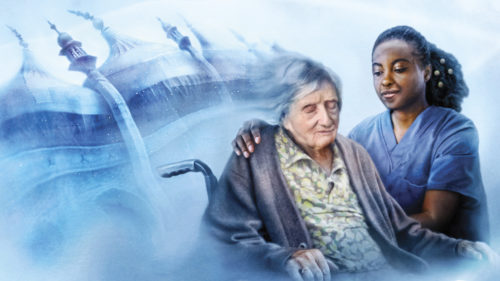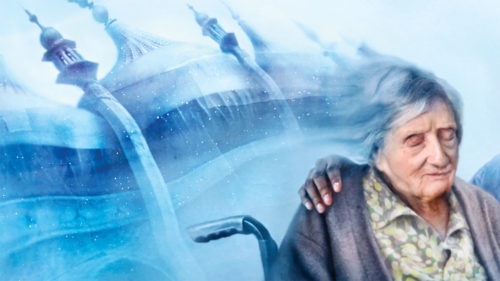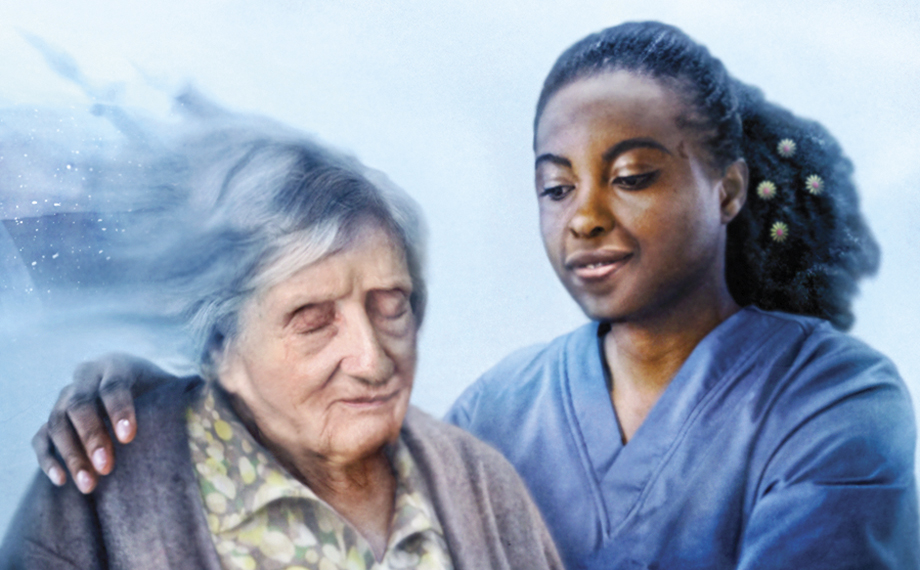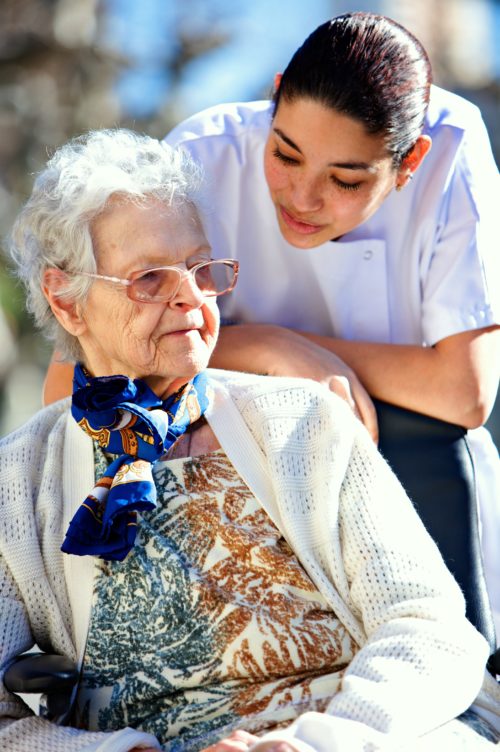latest
Fictions: When I Visit the Palace
When I Visit the Palace
Read the seventh instalment in our Fictions series.
Text by Liz Williams, artwork by Vincent Chong.
Fictions: Health and Care Re-Imagined presents world-class fiction to inspire debate and new thinking among practitioners and policy-makers. To find out about the project, the authors and to read other stories in the collection, click here.
Read the associated “Getting Real” blog, exploring the technology, science, policy, and societal implications of the themes from the story here.
When I Visit the Palace
Liz Williams
When I visit the palace, I see many marvellous things. I see young men with blue fans, cloaks of peacock feathers, high-heeled shoes. They wear white powdered wigs; their skin is brown. I see a golden cat on a golden lead, with sapphires dangling from the chain. They catch and spark in the light, drops of jewelled water, and reflect the fountains in the palace garden, which splash in constant motion until evening, when the fountains grow quiet and the wind from the mountains draws out the scent of the roses. It’s very faint, that scent, because although I can see the palace very clearly, all my other senses are muted. Very occasionally I can hear the murmur and hush of voices, catch the dim smell of the gardens, run my hand over the soft velvet of a curtain and feel a tiny pressure, taste nothing.
Here, it’s the other way round. I can still see, just about. The colours at the end of the narrow tunnel which is all that remains of my vision are faded. I can hear, though, thanks to the implant, but it wasn’t a top of the range model and sometimes it crackles and blasts. Things don’t seem to taste the same as they used to, but that might be the food these days, I don’t know. And I can touch things: the corrugated rough fabric of this chair, the soft, often-washed sheets. But it’s my vision I miss and when I visit the palace, I drink the sights in as if I were a sponge.
When I visit the palace, I don’t know what I look like to the people there, although I know they can see me. Here, I know exactly what my carers see. They see an old lady, with a badge pinned to her nightdress that says Robyn Backley. They see a person whom they are paid to look after. Some of them even see a retired English university lecturer. I make sure that they see a person who is interested in them, who remembers the things they say about their kids and their difficulties in getting to work, their pets and their problems.
I am eighty-two years old and I am in a nursing home, from which I won’t emerge again, except in an eco-coffin. That’s okay. Everyone has their span, I accept that. I’m old and getting older, winding down like an ancient clock. My batteries are running out. My knees have packed up. My eyes – well, I told you about that. But I can still visit the palace and that’s good enough for me. Before, all I had was the world and the world was – interesting, I suppose you might say, but we all leave the world behind eventually.
Mazaa sometimes sits with me. I like Mazaa, too. She is my main carer, the team leader. ‘Mazaa’ is a name for daisies in her own language, and she wears plastic daisies in her hair, which is always carefully arranged. I can see little bits of her, through the tunnel: it is like the story of the blind men, looking at the elephant. One man thinks it is a long thin creature, because he can only feel its tail. Another, touching its leg, believes it to be a column. But I have not always been so blind and so I know that Mazaa is a compact, strong woman, always immaculate in her carer’s uniform, with a ready smile that splits her face in two.
I also see, when she bends down, that Maz, as everyone calls her, takes a great deal of trouble with her hair. She sometimes does mine, whether I can see it or not. She was a hairdresser in her home city, Mek’ele, when she was a young girl, before she had to leave, before she became what they call a care health professional here.
“You have Ethiopian hair, Robyn,” she says.
“It’s frizzy,” I grumble. “Your hair isn’t frizzy.” For Maz has ringlets, like an empress, and she laughs.
“I mean it is a particular type of curly. It’s only frizzy because of your age.”
“I’m old and I have frizzy hair.” Do we all look back at old photographs and think how pretty we were? Pity we didn’t know it at the time.
“It’s because of hormone levels, I think. But that’s OK. We can still do things with it.” As she’s saying this, she is brushing my hair, very gently. She never tugs. Helen Atkins, who is in the room next to me, has her hair done by Zotia, one of the other care health professionals, and she says Zotia pulls.
“Like she’s trying to yank it out. She doesn’t like doing it. It bloody shows.”
“Why don’t you ask Maz to do it? She’s brilliant with hair.”
“Well.” I can’t see Mrs Atkins’ face very well at the end of my visual tunnel, but I can see enough to tell that it becomes closed and tight. As my nan used to say, a face like a smacked arse. “You know.”
She doesn’t say anything else but I do know, actually. She means that even though Zotia is Polish, she is still white, and Maz isn’t. I don’t know how this is even still a thing. But if she prefers tugged hair and watering eyes to someone who really understands hair, whatever, I think. When I was young, I’d have had plenty to say about that. But we are too old to argue now, too old to change our minds. What’s the point, in God’s waiting room?
#
“England’s so green,” Maz said. “At least, in winter.”
“Hot in the summer, though.”
She laughed. “Not so hot that you have to run away.”
“No, not so hot as that. Yet, anyway.”
“Perhaps we will all end up in the Arctic Circle. What’s left of it.”
She was joking, I think. But she might be right, all the same. Siberia was a way of saying ‘frozen’ when I was a little kid and now it’s a breadbasket. I don’t think I’ll live to see everyone crowd even further north and in a way I’m glad. But in a way, too, I’d like to see it. I’d like to find out what happens; it seems a shame to check out before my century is over. There are life-lengthening drugs, but not for the likes of me or Maz. I’m lucky, though: I had a house to sell, to fund my care, and a bit of a private pension.
“Might be a bit chilly, up in the Arctic.”
“I don’t think I could be too cold, or too wet.” She went quiet then. She didn’t need to say anything; I’d seen it on the news. Feels like yesterday: they’re right in that, time speeds up when you get old, speeding past you like a motorway. All the pictures on the news: the equatorial fires, places too hot to live in any more, the convoys of people streaming north. One of whom was now spraying my bedside cupboard with an anti-bacterial spray.
#
I have not told anyone about the palace. It is a recent thing: before that, I had visions of Wolverhampton. I can say with confidence that this was a lot less visually pleasing. I know Wolverhampton well; I was born in the Potteries and I lived in Wolverhampton for many, many years. I’m a Jug Head, not a Yam Yam, as they used to say. Now I’m back in Stoke, full circle. But I’m fond enough of the city, and when it started visiting me, I was quite pleased, having lost so much of the use of my eyes.
Then Wolverhampton, having visited, left me alone for a bit and was replaced by bits of Brum. I did finally confess this to the duty psychiatrist. She didn’t seem unduly alarmed.
“Is this dementia? Am I demented?”
“You don’t seem demented to me,” she said. We’d just been discussing the football results, about which I had opinions. She looked at her tablet. “I don’t think Villa should have won that match, either. I can’t believe the ref…I’m going to do some tests. D’you mind? Ask the nurse to take some bloods, that sort of thing.”
“Go ahead.”
So she did, and came back three days later to inform me that I had Charles Bonnet syndrome, which I’d never heard of.
“What Bonnet syndrome?”
“It’s not uncommon in elderly people who have severe macular deterioration. It’s as though, because you can no longer see, the visual processing bit of your brain gets bored and starts conjuring things up.”
“Like Birmingham city centre.”
“Yes, like that.”
“So I have a syndrome.”
“Yes. It’s not dementia, or a mental illness. I need to be very clear about that. It’s like dreaming but you’re awake.”
“Well, I don’t mind it.”
“That’s just as well, because I’m afraid there’s no cure. If you start to see things that are distressing or upsetting, do tell me, or someone. Don’t keep it to yourself.”
“I won’t.” Birmingham wasn’t upsetting, as such. It was rather nice to see it again.
I have no idea where the palace comes from.

There are benefits to being in this care home. Make no mistake, it is a terminal care facility. Apart from the Charles Bonnet thing, and being old, I have a terminal illness. Not cancer, or diabetes: we could perhaps have ironed those out. One of the newer ones. I was pretty healthy up to that point, but Djering’s Disease stopped me in my tracks for about six months. I was lucky, unlike a lot of people. Eventually they came up with a vaccine and life, with all its stops and starts throughout the 21st century, began again, which was just as well because I couldn’t afford to take early retirement and I didn’t want to go onto disability income – getting that’s like a full-time job in itself.
I had the jab every year after that, but although it stopped me from getting double D again, it didn’t help those of us who had already had the illness which, as became obvious a decade later, has a dormant phase. A Trojan horse, in fact. Something hides alongside Djering’s, takes its time, looks at the brochures of where it might take a holiday in the human body. With me, it was the bit of my nervous system that affects my legs. It took a while to come on fully, creeping up on me over the next ten years, and now I can’t walk at all. Eventually it will affect my cerebral cortex and shut it down and I will die.
But you have to die of something.
Initially I thought that was what the palace was all about, and in a way it was, because my failing sight and the Charles Bonnet Syndrome were probably caused by that, too, although they’re not sure. So my condition, like God, giveth and taketh away.
I was reminded of the benefits when Maz came in to wash me last night, and she absentmindedly picked up my hand to look at my wrist.
“Oh! Sorry. I keep forgetting.”
“It’s automatic,” I said.
“I’m so used to doing it.”
“Of course.”
She was close enough that I could see her own bracelet, busily humming away to itself, sending details of her blood pressure and sugar levels, her temperature and heart-rate, to Ambient, who own this particular care home, and thence to the Department of Health.
“I don’t miss mine,” I told her.
“It’s part of me. I’ve had one ever since I was little, in Mek’ele.”
“They didn’t have them when I was a kid,” I said.
Her eyes widened. “Really? No, I don’t suppose they did then.”
“I didn’t have a bracelet until I was grown up. But before that I had a Fitbit and all that stuff. I had an Apple watch.”
Maz nodded, as if impressed, but I might as well have told her that I carved all my letters onto a stone slab. Through the narrow tunnel of my vision, I could see that her own bracelet was a delicate thing: a transparent band with pretty gold swirls on it. The little lights showed the data transfer, which streamed up her interactive sleeve in faint scrolls. That would be my own readouts, the ones she’d just taken.
“So, when I was a kid,” Maz said. “We had all the stuff, because my part of Africa then was really ahead in tech and it was a big thing, you know, fashion and that. But before I was fitted with mine, my dad took me out to see my gran, one day, and she lived out in the countryside, and he ‘lost’ his bracelet.” She made quote marks in the air. “And we had a Talk.”
I nodded. I hadn’t had a Talk myself, because when my bracelet was put on my wrist, I was an adult and no-one had needed to tell me the downside: there had been enough rumour-mongering about it, before we all had to comply.
“Oh no! He lost it?”
“Well, yeah. Luckily he ‘found’ it again.”
It’s like a dance. Maz’s dad must have used some sort of black tech, to fuzz up the bracelet temporarily, and tell his daughter what she might expect when the pretty thing was put onto her little wrist. No-one knows quite what your bracelet does, but the rumours continue on the dark web, I understand. Your bracelet can hear everything you say, so you’re careful what comes out of your mouth. But more than that: if you’re watching a politician on the screen and your blood pressure goes up, your breathing quickens, all the signs and markers of anger, then they say that a note goes into your file somewhere, a little note, nothing more. But if all those notes add up, well. That’s a bit different. You might be invited into a Department of Health contractor’s office and given a Talk of an entirely other kind. And maybe you won’t get a pay rise that year, or maybe you find your social media platform isn’t working as well as it used to, or you’re denied some benefits and social security, what’s left of it, seems a bit vague as to why.
But no-one really knows this stuff for certain. There’s all sorts of conspiracy theories. Zotia, the other carer – who is lovely, by the way, even if she’s not good with hair, don’t get me wrong – is into all kinds of stuff and she doesn’t seem to get into trouble for it. Maybe these conspiracies serve some kind of government agenda – but then that’s a conspiracy as well, isn’t it? I just listen and smile.
I had a listen to all this just now – what I’ve recorded for you – and I realise that I’ve been rambling. Sorry about that. It would be out with the red tracker if I was marking one of my student’s essays. Maz was trying to check my bracelet when she picked up my hand, but of course my bracelet isn’t there any more. It developed some kind of fault, which that batch was apparently prone to, not surprising given how old it is, and a nice technician came to take it off.
“When will my new one be coming?” I asked him, because I felt a bit bald without it, really. Perhaps it was like losing a limb: you’re supposed to feel phantom pain. I didn’t feel pain, but I could feel an absence. Does that make sense?
“Oh,” he said. “I’m not sure. I expect they’ll let you know.”
Before I came here I’d never heard of anyone having a bracelet removed and not having a new one, but quite a lot of people here don’t have one. I could tell from his voice that he found it a bit awkward. They won’t bother to give you a new one because you’re not going to be here much longer and anyway, what can you get up to at your age?
I didn’t want to make any jokes about time off for good behaviour. I sort of missed it: it’s like a little friend, after all. It’s your doorway to all sorts of things: social media and the net, the news, your friends, your books, your tech. Without it, there was just me and the solid world. It’s one reason I’m grateful for Charles Bonnet.
But I can’t help wondering if the palace is some kind of legacy. A digital artefact, somewhere in cyberspace. What if CB syndrome isn’t just your daydreaming mind, but a glimpse into some other reality? That’s partly why I’ve not mentioned the palace to anyone. Don’t want to get accused of some kind of subversive activity or impure thoughts at this stage. And also, I think it might just sound a bit mad, frankly.
#
There is a girl who lives in the palace. I see her more and more frequently. She is very beautiful. Her hair is black and ringleted, like Maz’s, but her face is broader and less angular, and her skin is darker. She wears an ice-blue crinoline and she carries a fan. Her earrings are made of fronds of coral. She always smiles when she sees me, as though she is delighted I’m there. I would like to ask her what her name is, but when I try to speak she leans closer, listening intently. But then she shakes her head.
#
Back in reality, Maz has been offered another job. She is debating whether to take it, and asks me what I think when she brings me some tea.
“It’s the same salary. But the possibilities for promotion are better. The thing is, though, I don’t just want to go into admin; I like my clients.”
“Would you have to move?”
“No, it’s in Stoke. So it would be the same commute. It’s even on the same tramline.”
“Well, it’s your market.”
“Yes, it’s not as though I don’t have choices.”
Ambient is constantly advertising for personnel. I used to see the big pop-ups on my way to university, suddenly manifesting on the side of the tramtracks, on buses. It’s the last stage in the equation that has been playing out over the course of my life: more people dying from NCDs like diabetes and heart failure, plus periodic pandemics, population growth slowing down because women like me want more from life than looking after kids. In times gone by, the kids would have been the ones to look after us. Now, that task falls on people like Maz.
“It’s just as well for you lot that central Africa heated up,” Maz said once to me, rather tartly. I think Mrs Atkins had had a go. “Otherwise who would be plumping up your pillows now?”
Maz is right. Who would? Care is one of this country’s biggest industries now. Maz and I are little cogs in a big people factory. But Maz is in a good position; she’s the one in demand.
#
I noticed recently that the palace is appearing more and more often. I don’t know if that means I’m really bored – there is a TV in this room but I can’t be bothered with the rubbish they put on it these days – or whether it means something else. And it seems to me that, although CB syndrome is supposed to be visual only, I did, as I’ve told you, have other impressions of the palace, like the scent of the flowers, and this seems to be increasing. Last night the roses were really quite strong.
#
Maz has decided to take the new job.
“Like I said, it’s the same salary initially. But if I do go up a grade, that does mean more pay.”
“That makes sense. I think it’s a good idea, Maz.”
“Cheers! I wanted to run it past you.”
“Most people wouldn’t bother about what an old woman like me thinks.”
“You know how the world works. I think we ought to listen to older people more.”
“That’s your culture talking, Maz, not mine.”
“Well.” She is too diplomatic to say that she has a lot of opinions about the way the English do things.
“But I should be saying congratulations,” I add.
“I’ll miss you. Maybe I could come back and see you sometimes?”
“I’ll miss you, too. And yes, I’d like that, but don’t worry if you can’t. I know what it’s like, and you’ll have a lot on your plate. When are you actually leaving?”
“At the end of the month.” That’s about a week away. “I gave in my notice and Ambient say I can leave then, because it’s the same company.”
So Zotia will be team leader, apparently, and that’s good: in spite of some of her crazy ideas, she’s a very good person.
#
In the last week, I’ve been seeing more of the palace than ever before. I’ve been spending a lot of time there. I’m sure the carers just see an old lady staring into space. But I’ve been having adventures. I can hear the girl in the ice-blue dress now – her name is Marjani. I told her my name. She took me by the hand and we walked to the edge of the palace, a high battlemented wall. Up the steps, and there from the wide parapet I could see the desert beyond, mile upon mile of hot empty red.
“Does anyone live there?” I asked Marjani and she said, “Not any more.”
#
Maz came to see me to say goodbye today. I’m recording this just after she left. We both cried a bit although we didn’t mean to. We both apologized. The tunnel has narrowed to a tiny point now and I couldn’t see her face, just a scrap of her uniform, but I could hear her sadness in her voice and that set me off, too. While she was there, I started seeing the palace. I thought it might be worth a try, so I asked Maz to bend down and look over my shoulder.
“Can you see it?” I asked her. She knows about the CB syndrome.
“I can see the window and the garden, but – oh. I think I can see something, maybe. A sort of lightness Is it very blue?”
“Yes, all blue, and wonderful.”
“I can’t see anything really. Just a patch of blue, all of a sudden. It’s gone now.”
I didn’t know if she was just humouring me, but then, there was the blue. I told her about Marjani.
“That’s an Ethiopian name,” she said. “It means ‘coral’. How lovely, to have a palace.”
“It’s better than the television,” I told her.
I heard her say, “I’ll come and see you, as soon as I can. Goodbye, Robyn.”
“Goodbye, Maz.”
I would like to see her again but I don’t think I will. I’m recording this now but then I’m going to put the recorder in the bedside drawer. And then I will rise and walk from this room into the palace, where everything is so blue, and I will not look back again.




